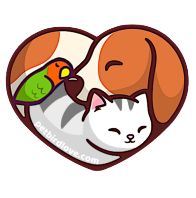Baby bird feeding Q&A
- 羽衣の家

- 2021年10月2日
- 讀畢需時 3 分鐘
When the chicks dance for the milk, they are indeed very cute and attractive, and can cause many people who have never raised any bird fall in love at first sight. However, it is difficult to raise chicks, especially when chicks leave its peer group and go to a new environment, their behavior can change completely. The chicks that do not know how to bite need to be fed every two or three hours. Feeding must start at 6AM every morning. The weaning period of different species of birds is completely different. Generally speaking, the longer the bird’s life, the longer the weaning period. In case of lacking 'milk'** and insufficient food, or improper feeding, the young birds will croak and make terrible noises. You must consider carefully before deciding to raise unweaned chicks.
** the 'milk' here refers to chicks' formula, not cow's milk!
What to do if chicks are not willing to eat?
Many novices encounter the above problems. When the chicks leave the group and go to a new environment, they will behave differently and may become difficult to handle because they are afraid and being unused to the environment. Very often, when the milk is fed but the chicks don’t even open their mouths, it’s because they are afraid and don’t know you are feeding them. You can drop a drop of hot milk on the chick's beak, and it may open its mouth when it feels the temperature. But yes! Pay attention to milk temperature when feeding! It is generally recommended to use hot water and a thin glass cup to prepare the mixture, and then use a bowl to soak the outside with hot water to keep warm. Be sure to use the "back of your hand" to test the temperature (not your fingers) before feeding. When feeding the chicks, it must be warm enough but not hot (the temperature should not exceed 37 degrees).
Baby will feel full?
Yes they know! When the chicks are full, they will turn their heads away and stop asking for milk. The crops of full-fed chicks will swell, and the crops will be emptied after about 2-3+ hours of digestion, and the chicks can be fed again afterwards. Feeding should start at 6AM every day. Generally speaking:

For chicks up to 2 weeks old: feed every 2-3 hours (after the crops are emptied);
For chicks of 2-3 weeks old: feed every 3-4 hours;
For chicks of 3-4 weeks old: feed every 4 hours, and place "Pet Bird Love's chick formula" and water within easy reach of the chicks;
For young birds of 5-6 weeks old: depending on the species and their ability to bite, feed 2-3 times daily, and place "Pet Bird Love's chick formula" and water within easy reach, and encourage birds to eat by themselves;
For young birds over 7-8 weeks old, start skipping the morning milk gradually, and only feed milk to full crop before going to bed, and encourage the young birds to eat on their own during the rest of the time;
Baby birds older than 8 weeks should start weaning, i.e., eat on their own.
Can chicks change milk formula?
Sure. For the first meal or two, simply mix the new milk powder with the old milk powder, so that the chicks can get used to it gradually.
Is thin milk easier to feed and better?
Of course not! Of course not! Of course not! Of course not!
If the concentration of milk is not enough, it will quickly lead to long-term hunger and lack of nutrition in the chicks, leading to developmental delays, and then other physical and mental problems. Unless it is a chick that is just out of its shell and has been abandoned, chicks that are generally more than one week old must be fed with thick paste-like milk of 1:2 powder to water, i,e., 1 part milk powder to 2 parts water.
How to teach weaning?
You can use "Pet Bird Love's chick formula" and place it in the cage where the young birds can easily reach it, and let them bite it in the cage. The owner can also put it in front of the birds to encourage them to try. Maintain normal milk-feeding (but half the amount of milk in the morning and gradually skip the morning milk entirely), but never skip all milk-feeding suddenly. Young birds will automatically become tired of milk as their own feeding ability increases.